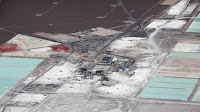Producers of processed lithium - an essential element for batteries used in electric cars - are agreeing long-term contracts with their customers to fund the investments needed to address a looming shortfall.
Demand for battery-grade lithium compounds is expected to skyrocket in the next decades in tandem with soaring demand for electric cars as governments and individual consumers try to reduce their carbon footprint.
Although there's plenty of lithium around, the problem is ensuring there is enough capacity to process it.
Battery makers and other end-users such as car manufacturers will need to sign multi-year deals that encourage large producers to invest more, and faster, industry sources say.
Some of that is already happening.
"We've established the timeline for our own expansion based on the commitments our customers are making with us," said Tom Schneberger, global business director at U.S.-listed FMC Lithium (FMC.N), one of the world's top four producers.
"Our first priority will be to provide the adequate supply of the high quality products upon which (our strategic customers) rely," he told Reuters.
Expansion plans by Chile's Sociedad Quimica Y Minera (SQM) SQMa.SN, another of the top four, for next year are also based on long-term agreements, the company told Reuters.
The production and use of electric cars is projected by Morgan Stanley analysts to rise to 2.9 percent of 99 million new vehicles in 2020 and to 9.4 percent of 102 million new vehicles in 2025, from 1.1 percent of 86.5 million this year.
By 2050, 81 percent of 132 million new auto sales will be electric, Morgan Stanley says.
Limited Visibility
The lithium-ion batteries needed to power electric cars use lithium carbonate or lithium hydroxide, but the industry typically talks in terms of lithium carbonate equivalent which contains both.
Two types of lithium deposits dominate.
One is hard rock as found in Australia, for which ready-to- go capacity to produce battery grade lithium can take up to three years. The other is brine, mostly found in Chile and Argentina, which can take seven years or more.
China has reserves of both.
Consultants Roskill estimate 785,000 tonnes of lithium carbonate equivalent a year will be needed by 2025, amounting to a 26,000-tonne shortfall from anticipated supply, compared to 217,000 tonnes of demand versus 227,000 tonnes of supply this year.
Others expect an even larger deficit.
"There's limited visibility into where we're going to get the last 200,000 tonnes of lithium if we hit the numbers Roskill is expecting for 2025," said Seth Ginns, a managing director at Jennison Associates.
Jennison manages more than $164 billion of investment and is a top 10 investor in both FMC and U.S.-listed Albemarle (ALB.N), another of the top four producers.
"We estimate the lithium industry is going to need between $4-$5 billion of investment out to 2025," said Simon Moores, managing director at Benchmark Minerals Intelligence.
Price projections out to 2025 are not available, but Benchmark estimates prices of lithium carbonate will average $13,000 a ton over the 2017-2020 period from around $9,000 a ton in 2015-2016.
Demand for lithium hydroxide, preferred over carbonate as it allows greater battery capacity and longer life, is expected to grow at a faster pace. Benchmark predicts the price to average $18,000 a ton between 2017-2020 against $14,000 in 2015-2016.
Read more at Lithium Processors Prepare to Meet Demand in Era of Electric Car

No comments:
Post a Comment